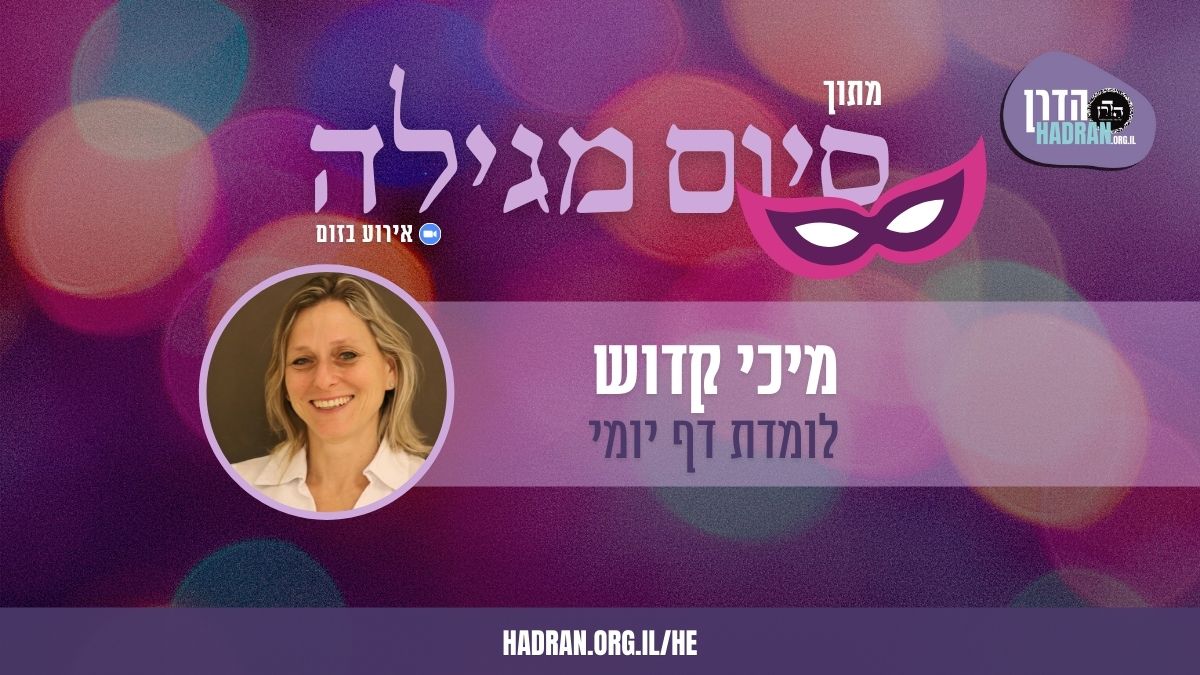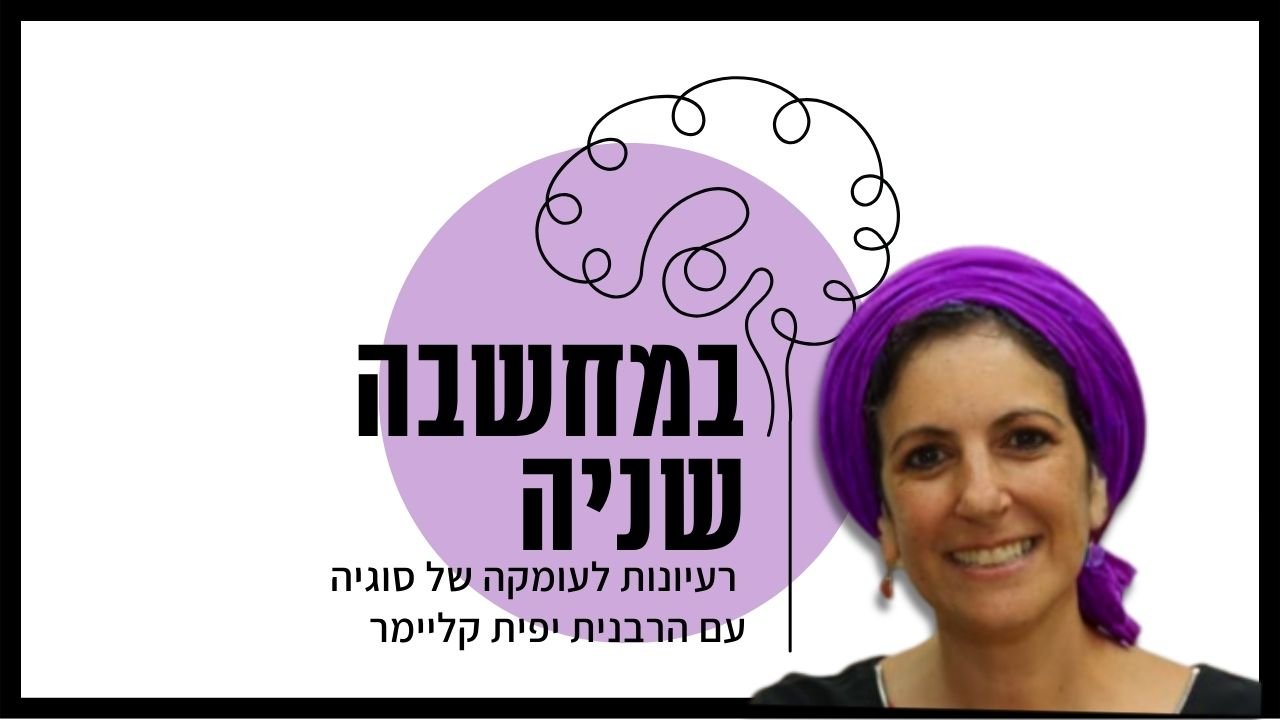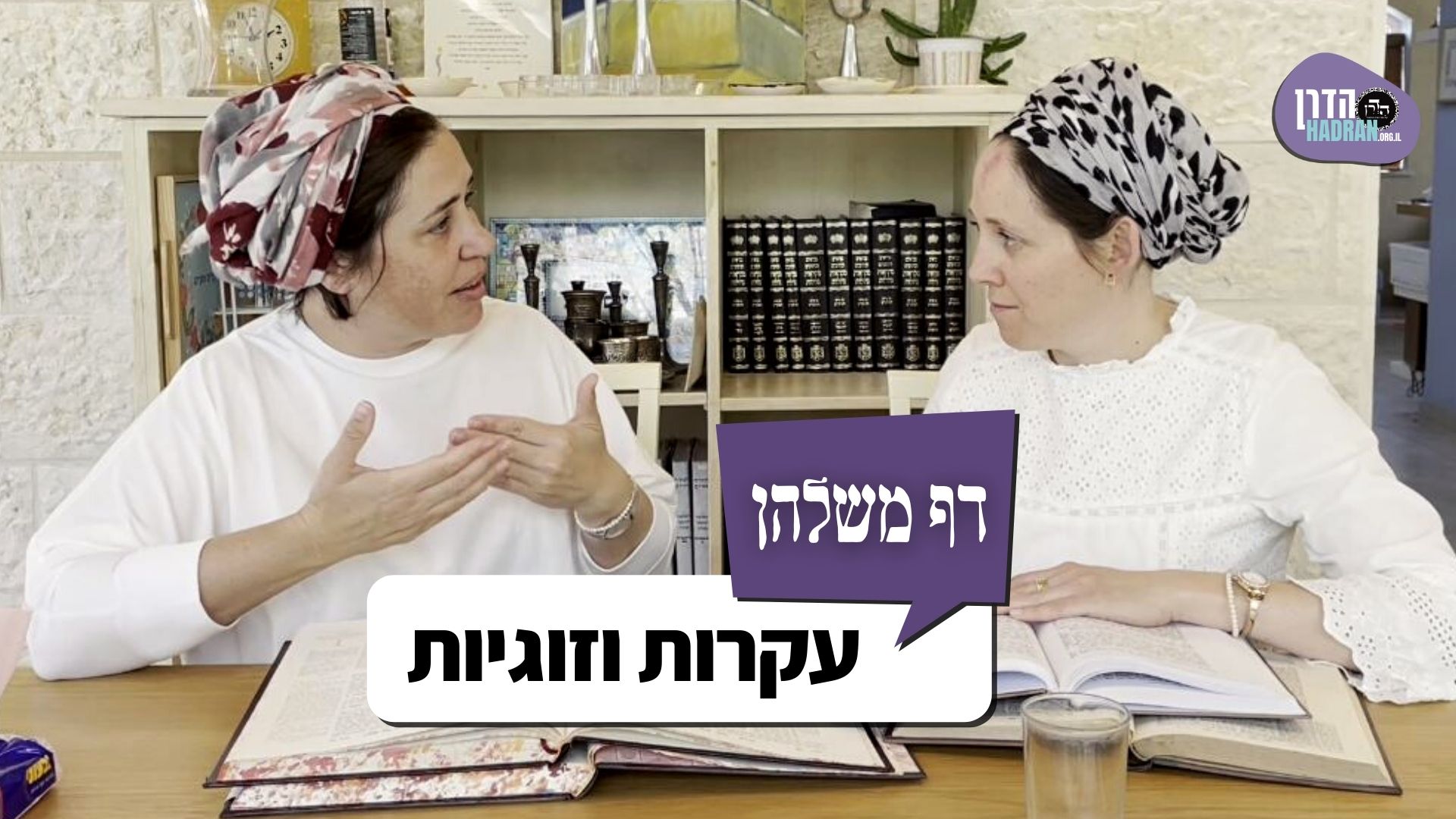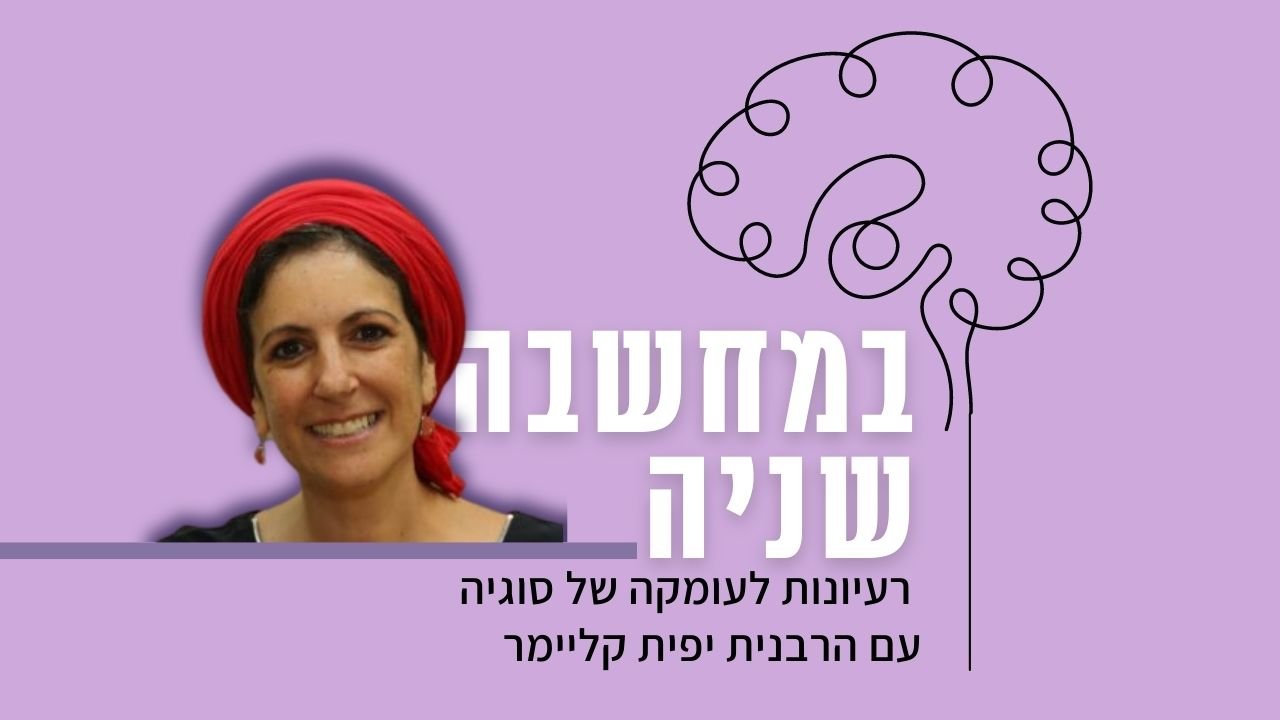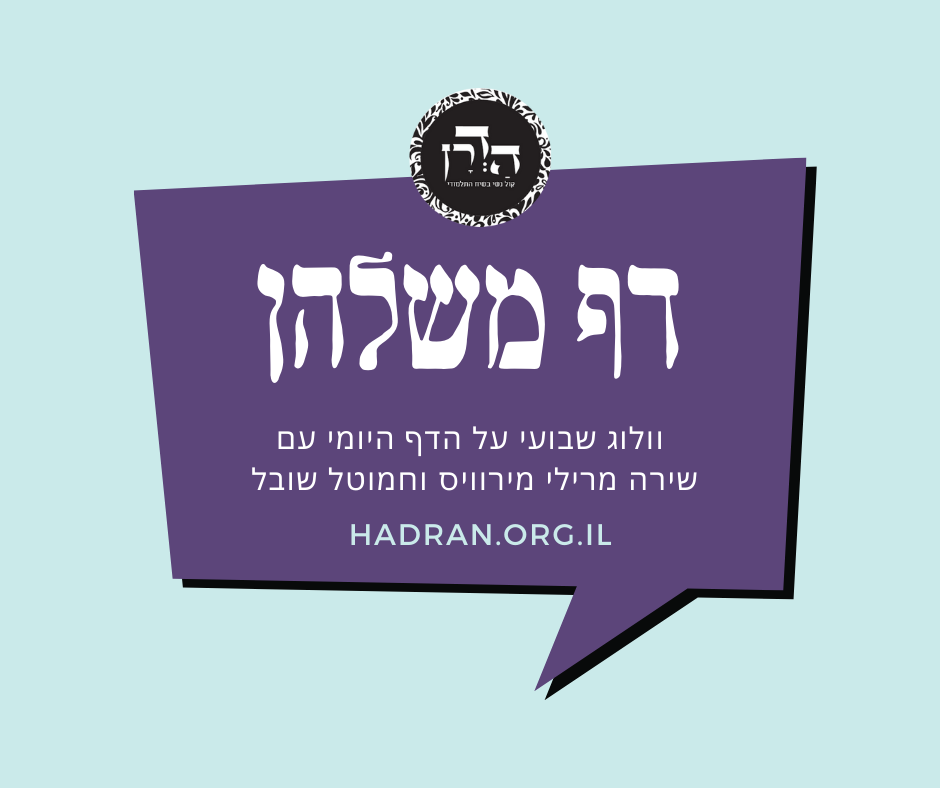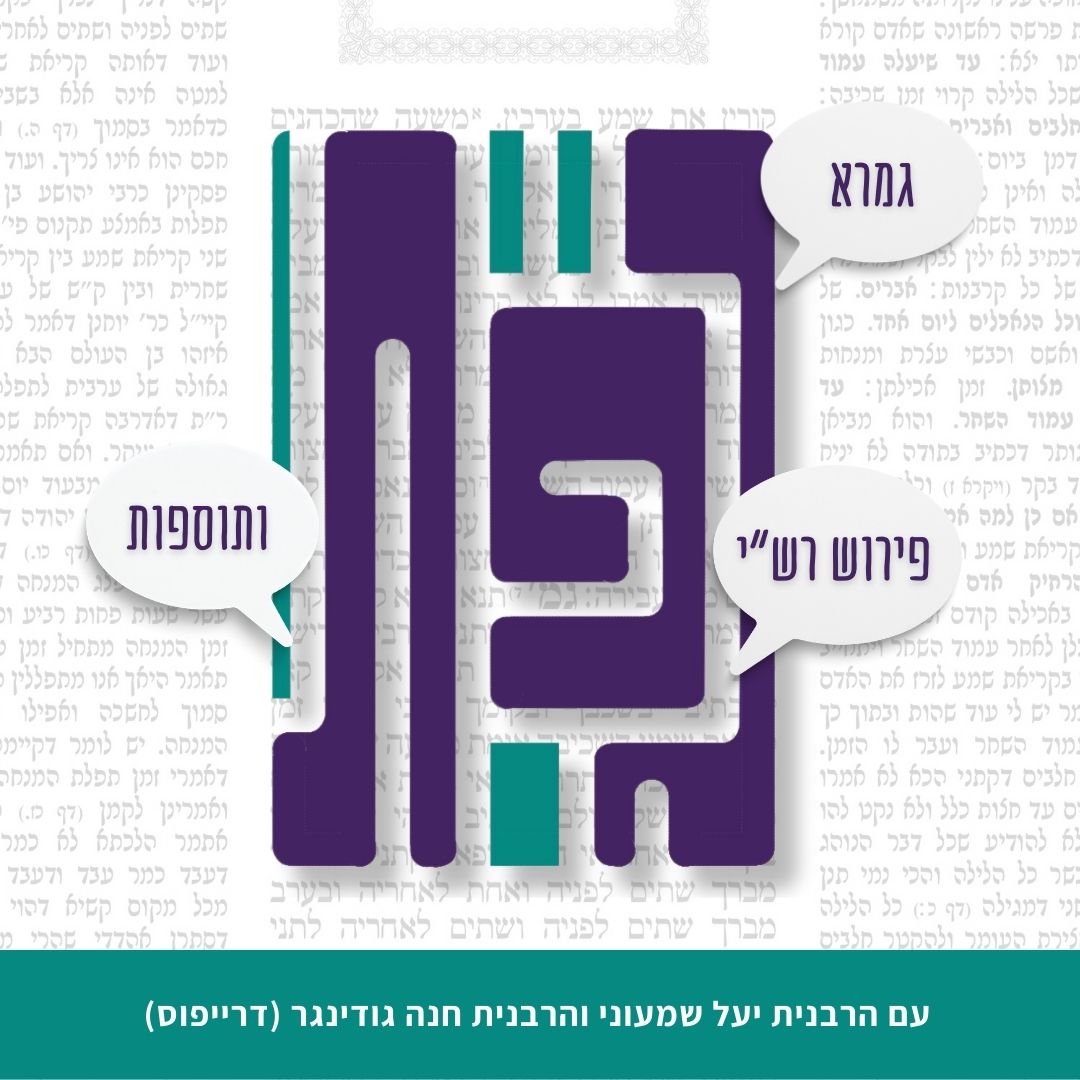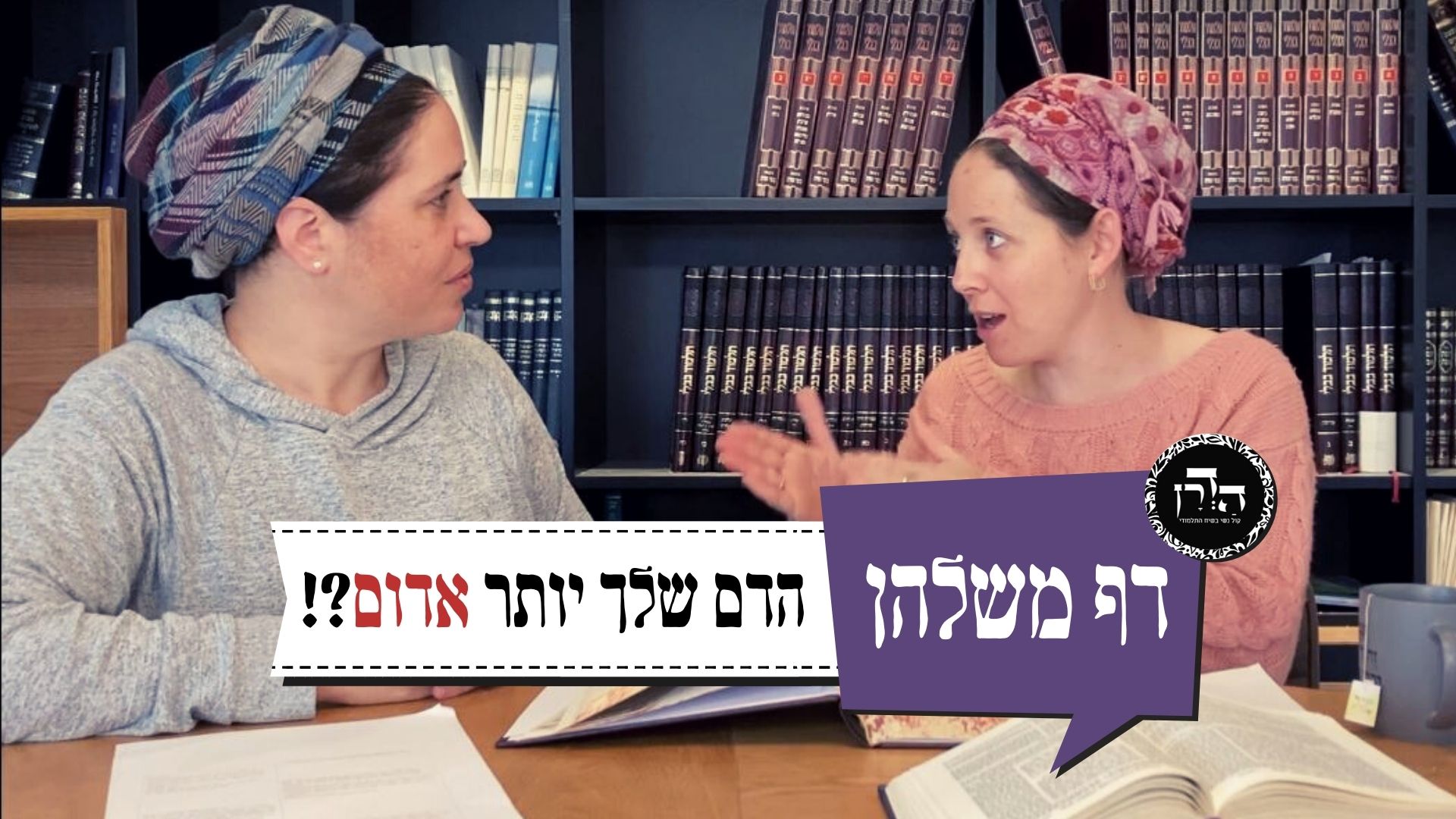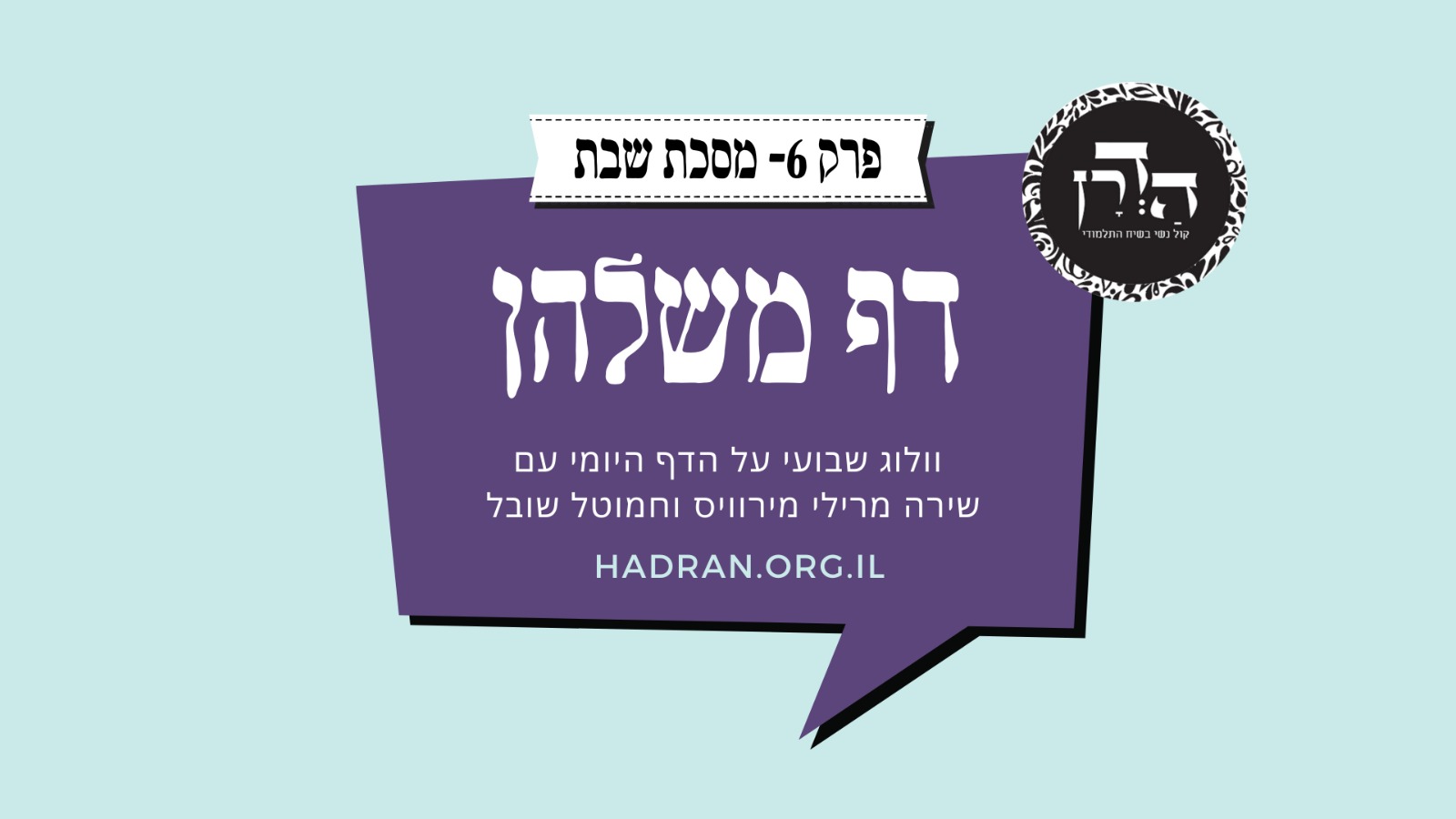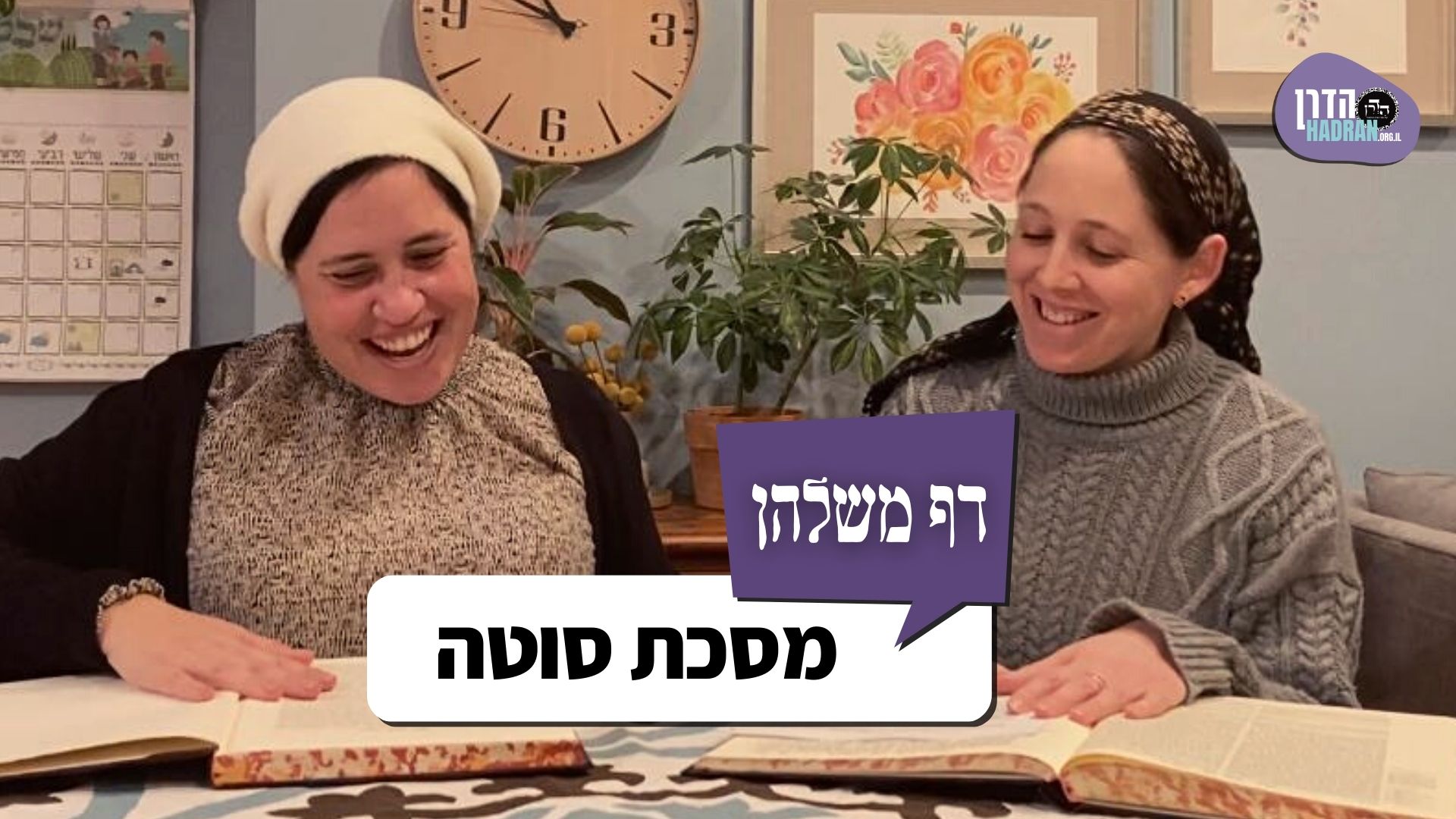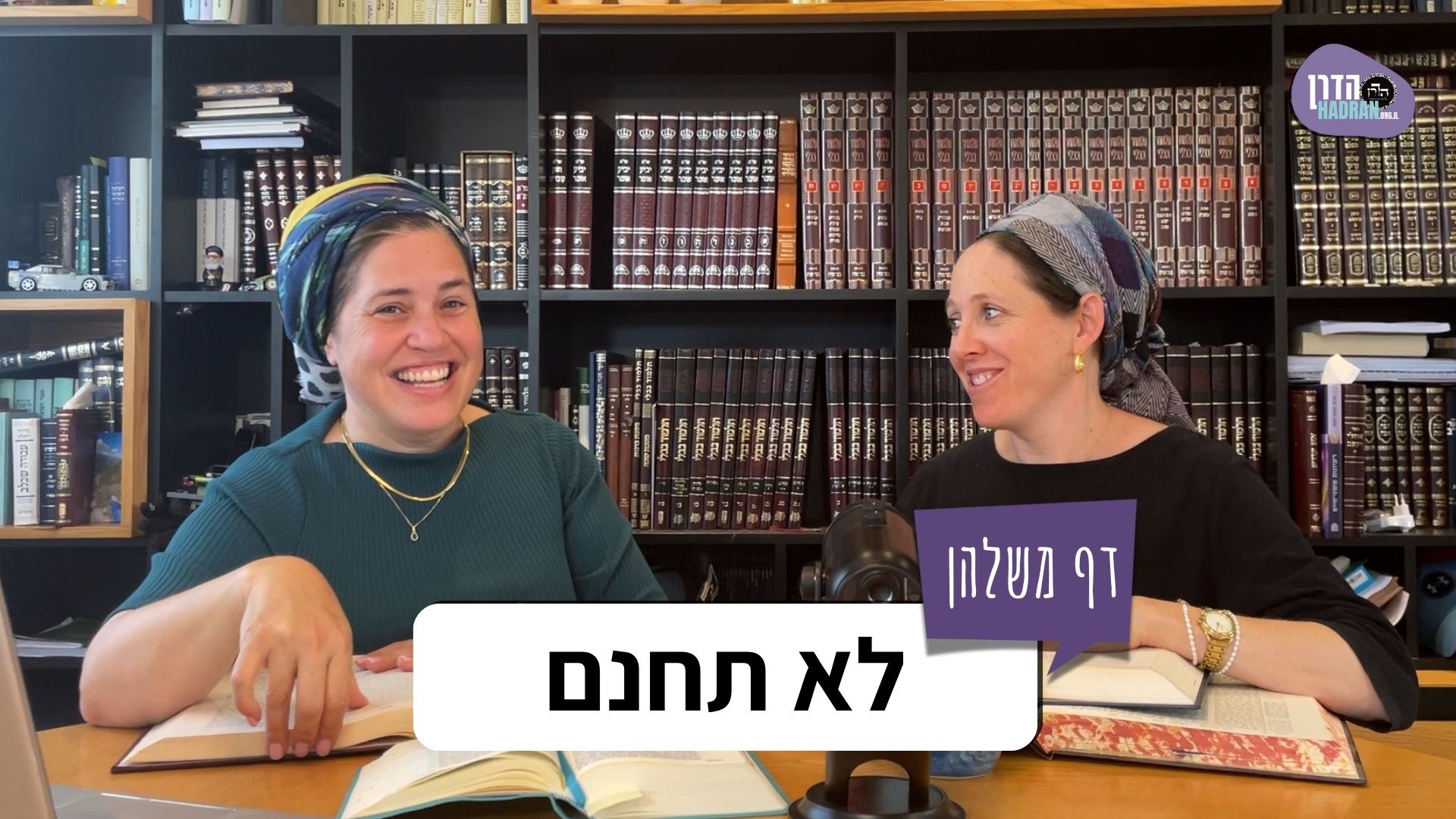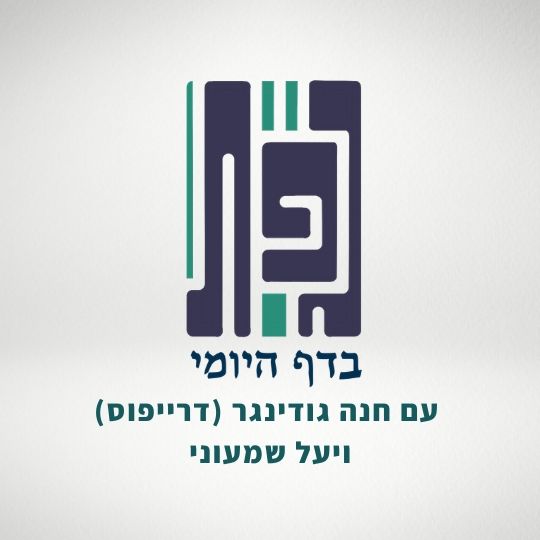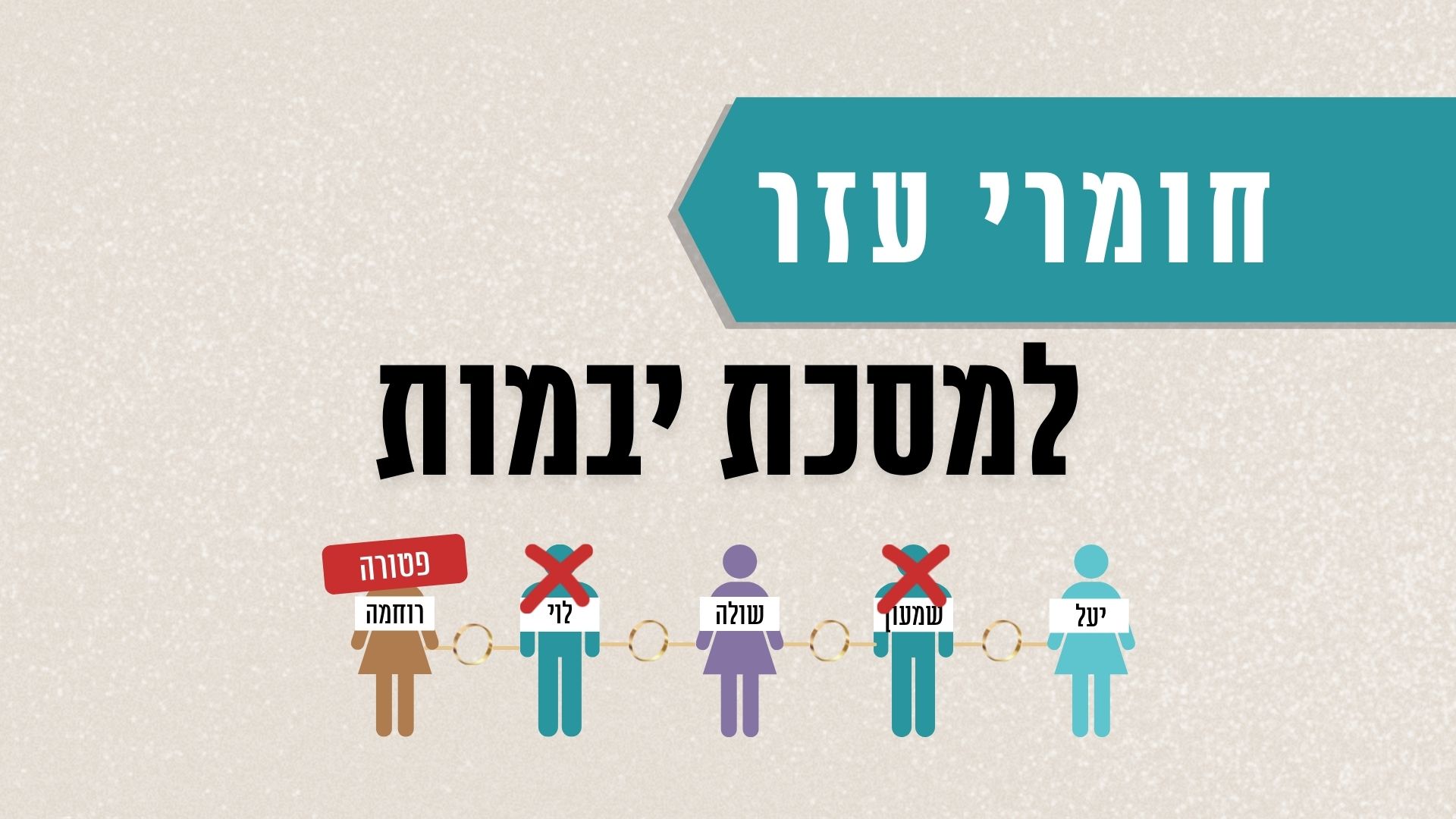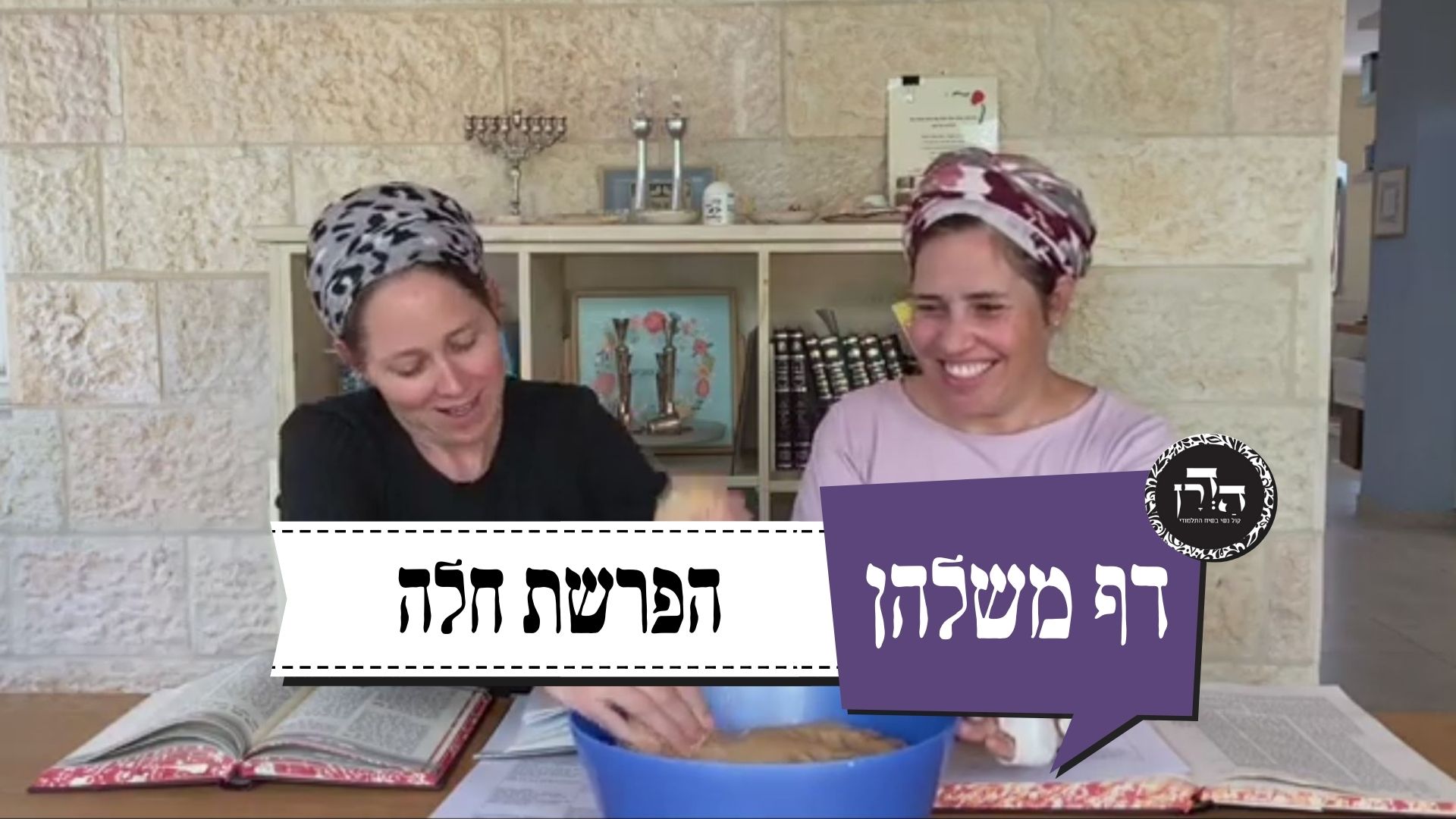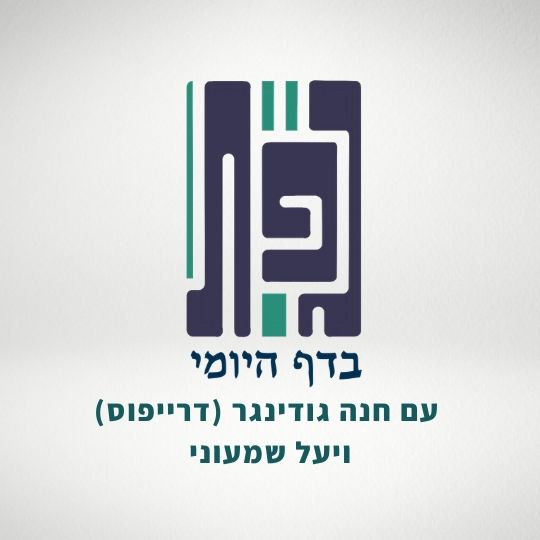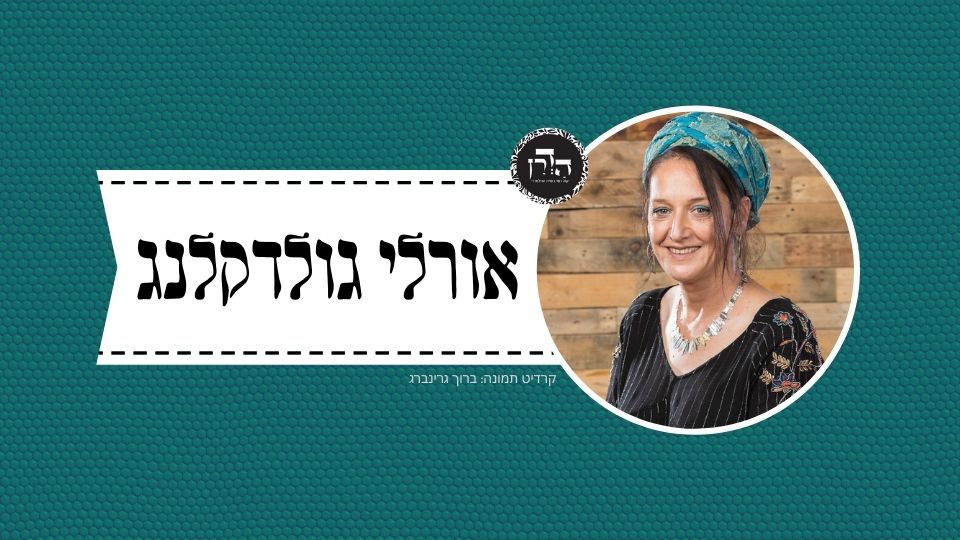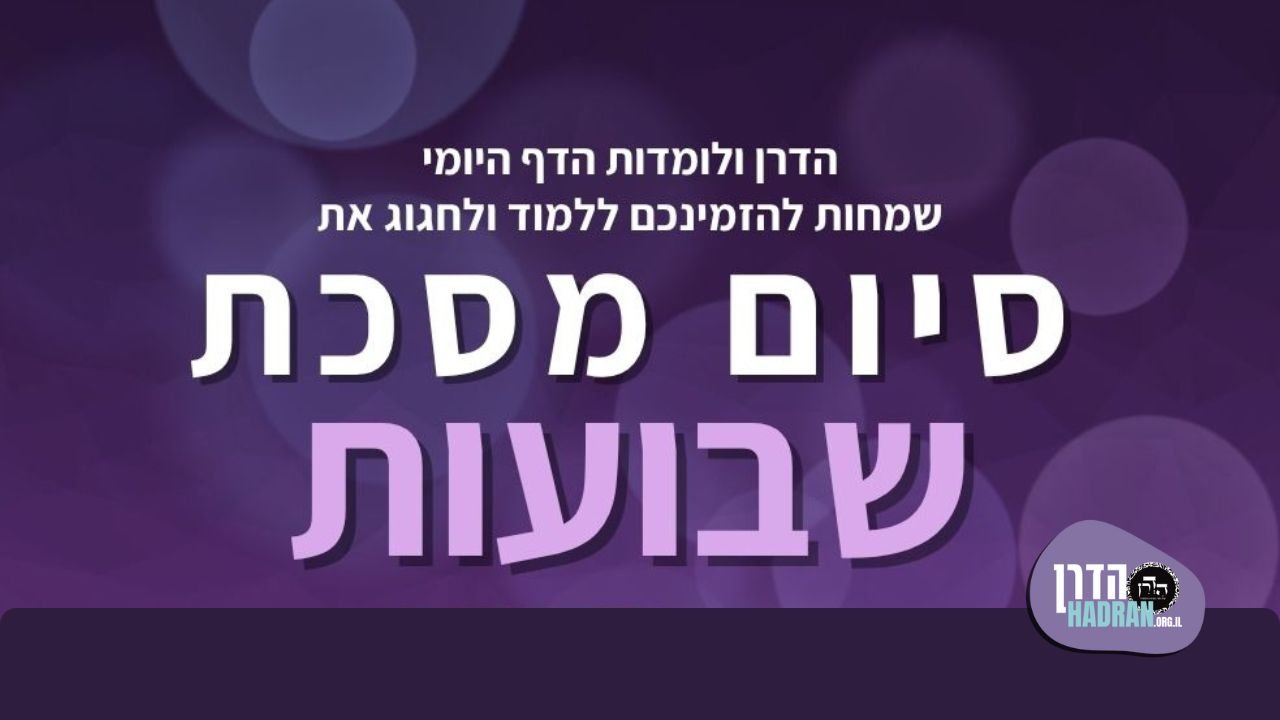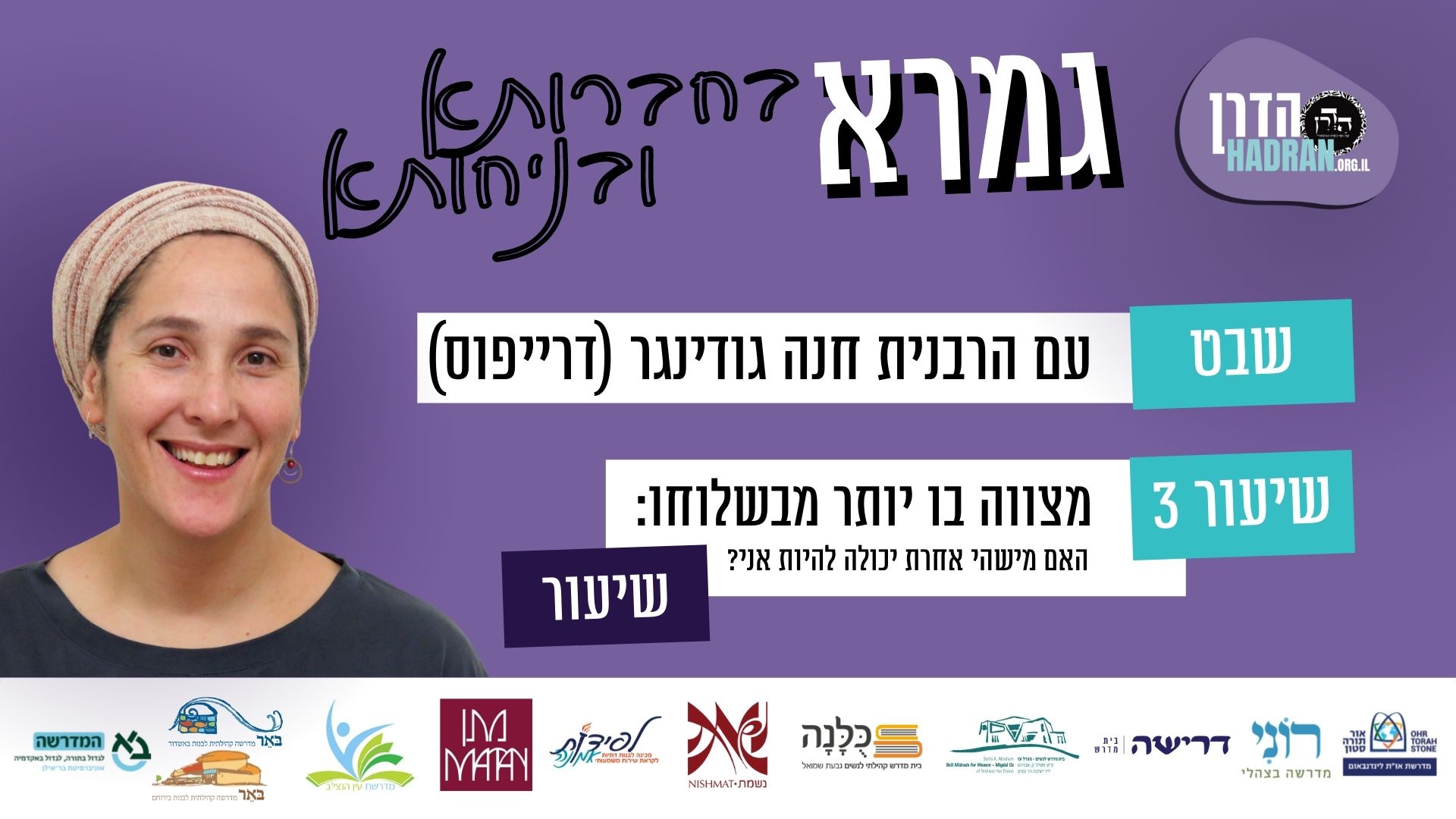מה קורה בכל סוג קרבן בכל שלב – הוקדש, נשחט, נזרק דמו (או משהו בדומה לכך – כגון הקטרת קומץ וכו’)? מתי דין מעילה תקף או לא תקף? האם הוצאת הדשן נחשב כמצווה אחרונה של הקרבת קרבן או לא חלק מהקרבן בכלל אלא דבר הקשור לטיפול במזבח? מי העובר על מעילה, מה עושים עם הכסף שצריך לשלם? גם על זה יש מחלוקת.

כלים
הלימוד החודש מוקדש לרפואת פיליס הכט, גיטל פעשא בת מאשה רחל על ידי חברותיה הרבות שאוהבות ומעריכות אותה.
כלים
העמקה
רוצה להבין מה באמת קורה מתחת לפני השטח של הסוגיה?
שיעורים, פודקאסטים והרחבות של מיטב המורות שלנו יפתחו לך עוד זוויות וכיווני חשיבה.
חדשה בלימוד הגמרא?
זה הדף הראשון שלך? איזו התרגשות עצומה! יש לנו בדיוק את התכנים והכלים שיעזרו לך לעשות את הצעדים הראשונים ללמידה בקצב וברמה שלך, כך תוכלי להרגיש בנוח גם בתוך הסוגיות המורכבות ומאתגרות.
פסיפס הלומדות שלנו
גלי את קהילת הלומדות שלנו, מגוון נשים, רקעים וסיפורים. כולן חלק מתנועה ומסע מרגש ועוצמתי.
מעילה ט
וְהָתַנְיָא: ״מִסׇּלְתָּהּ וּמִשַּׁמְנָהּ עַל כׇּל לְבֹנָתָהּ״ – פְּרָט שֶׁחָסְרָה סׇלְתָּהּ וְחָסְרָה שַׁמְנָהּ וְחָסְרָה לְבוֹנָתָהּ!
but isn’t it taught in a baraita: The verse states: “And he shall bring it to Aaron’s sons the priests; and he shall remove his handful of its fine flour, and of its oil, together with all its frankincense; and the priest shall make its memorial part smoke upon the altar, an offering made by fire, of a pleasing aroma to the Lord” (Leviticus 2:2)? This verse excludes those situations where some of its flour was missing, or some of its oil was missing, or some of its frankincense was missing, in which case the priest may not place the meal offering on the fire. This indicates that one must ensure that some of the flour, oil, and frankincense remain.
אָמְרִי: הָתָם כְּתִיב ״וְהַנּוֹתֶרֶת״, קְרָא יַתִּירָא כְּתִיב.
The Sages said in response to the difficulty of Rav Aḥa, son of Rava: In general, the terms “remainder” or “leftover” refer to a situation where there happened to be some of the item remaining. Yet, the case of the meal offering is unique, as there it is written: “But that which is left of the meal offering shall be Aaron’s and his sons’; it is a thing most holy of the offerings of the Lord made by fire” (Leviticus 2:3). This part of the verse is superfluous, as it appears in Leviticus 2:10 as well. It is therefore derived from the repetition of this phrase that in the specific case of a meal offering one must ensure that some of the items remain. This requirement does not apply to a bird sin offering.
מֵתִיב אֲבוּהּ דִּשְׁמוּאֵל לְרַב הוּנָא: אֶחָד חַטַּאת הָעוֹף וְאֶחָד עוֹלַת הָעוֹף שֶׁמְּלָקָן וּמִיצָּה דָּמָן חוּץ לִמְקוֹמָן – פָּסוּל וְאֵין בּוֹ כָּרֵת. חוּץ לִזְמַנָּן – פִּיגּוּל וְחַיָּיבִין עָלָיו כָּרֵת. קָתָנֵי מִיהַת מִיצָּה דָּמָן!
Shmuel’s father raises an objection to Rav Huna from a mishna (Zevaḥim 64b): With regard to both a bird sin offering and a bird burnt offering, where the priest pinched their nape or squeezed out their blood with the intent to partake of an item whose typical manner is to partake of it, or to burn an item whose typical manner is to burn it on the altar, outside its designated area, the offering is not valid, but there is no liability for karet for one who partakes of the offering. If his intent was to eat it or burn it beyond its designated time, the offering is piggul and one is liable to receive karet for partaking of the offering, provided that the permitting factor, the blood, was sacrificed in accordance with its mitzva. In any event, this mishna teaches: Squeezed out their blood, indicating that failure to squeeze out the blood disqualifies the offering.
הוּא מוֹתֵיב לַהּ וְהוּא מְפָרֵק לַהּ: לִצְדָדִין קָתָנֵי.
Shmuel’s father raises the objection and he resolves it himself. The tanna of that mishna teaches it disjunctively. In other words, the two clauses of the mishna are referring to two different cases. The halakha of pinching the nape of the neck applies to both the bird sin offering and the bird burnt offering. By contrast, the squeezing out of the blood applies only to a bird burnt offering, whose blood is not sprinkled on the altar. For this reason, the priest’s intent at the time of squeezing out the blood is significant. In the case of a bird sin offering, it is only an intent at the time of sprinkling that invalidates the offering.
גּוּפָא, תָּנָא דְּבֵי רַבִּי יִשְׁמָעֵאל: שֶׁאִם נִשְׁאַר בַּדָּם.
The Gemara returns to the matter itself, i.e., the baraita cited above: The tanna of the school of Rabbi Yishmael taught that if any of the blood remains inside the bird it must be squeezed out, but there is no requirement to ensure that blood remains for this purpose. Consequently, even if one does not squeeze out the blood on the side of the altar, the offering is valid.
וְהָא תָּנָא דְּבֵי רַבִּי יִשְׁמָעֵאל הָתָם: שִׁירַיִים מְעַכְּבִין, וְאָמַר רַב פָּפָּא: מִיצּוּי חַטַּאת הָעוֹף אִיכָּא בֵּינַיְיהוּ! תְּרֵי תַנָּאֵי, וְאַלִּיבָּא דְּרַבִּי יִשְׁמָעֵאל.
The Gemara asks: But the school of Rabbi Yishmael taught there, on Zevaḥim 52a, that failure with regard to the remainder of the blood invalidates the offering, and Rav Pappa said: Both Rabbi Yishmael and Rabbi Akiva agree that failure to pour the remainder of the blood on the base does not invalidate the offering. The practical difference between them is whether or not failure to squeeze out the blood from a bird sin offering after sprinkling the blood invalidates the offering. The school of Rabbi Yishmael rules that it does invalidate the offering, and Rabbi Akiva maintains that it does not invalidate the offering. The Gemara answers: There are two tanna’im and they disagree with regard to the opinion of Rabbi Yishmael.
מַתְנִי׳ עוֹלַת הָעוֹף – מוֹעֲלִין בָּהּ מִשֶּׁהוּקְדְּשָׁה. נִמְלְקָה – הוּכְשְׁרָה לִיפָּסֵל בִּטְבוּל יוֹם, וּבִמְחוּסַּר כִּפּוּרִים, וּבְלִינָה. מִיצָה דָּמָהּ – חַיָּיבִין עָלָיו מִשּׁוּם פִּיגּוּל, נוֹתָר, וְטָמֵא. וּמוֹעֲלִין בָּהּ עַד שֶׁתֵּצֵא לְבֵית הַדֶּשֶׁן.
MISHNA: One is liable for misusing a bird burnt offering from the moment that it was consecrated. When the nape of its neck was pinched, it was rendered susceptible to disqualification for sacrifice through contact with one who immersed in a ritual bath that day, and through contact with one who has not yet brought an atonement offering, and through its blood being left overnight. Once its blood was squeezed out, one is liable to receive karet for eating it, due to violation of the prohibition of piggul, and the prohibition of notar, and the prohibition of partaking of sacrificial meat while ritually impure. And as it may not be eaten, one is liable for its misuse until it leaves to the place of the ashes, where it is burned.
פָּרִים הַנִּשְׂרָפִים, וּשְׂעִירִים הַנִּשְׂרָפִים – מוֹעֲלִין בָּהֶן מִשֶּׁהוּקְדְּשׁוּ. נִשְׁחֲטוּ – הוּכְשְׁרוּ לִיפָּסֵל בִּטְבוּל יוֹם, וּבִמְחוּסַּר כִּפּוּרִים, וּבְלִינָה. הוּזָּה דָּמָן – חַיָּיבִין עֲלֵיהֶן מִשּׁוּם פִּיגּוּל, נוֹתָר, וְטָמֵא, וּמוֹעֲלִין בָּהֶן בְּבֵית הַדֶּשֶׁן עַד שֶׁיַּתִּיךְ הַבָּשָׂר.
One is liable for misuse of bulls that are burned and goats that are burned from the moment that they were consecrated. Once they were slaughtered, they were rendered susceptible to disqualification for sacrifice through contact with one who immersed that day, and through contact with one who has not yet brought an atonement offering, and through its blood being left overnight. Once its blood was sprinkled, one is liable to receive karet for eating it, due to violation of the prohibition of piggul, and the prohibition of notar, and the prohibition of partaking of sacrificial meat while ritually impure. And one is liable for its misuse even when it is in the place of the ashes, until the flesh has been completely scorched.
הָעוֹלָה – מוֹעֲלִין בָּהּ מִשֶּׁהוּקְדְּשָׁה. נִשְׁחֲטָה – הוּכְשְׁרָה לִיפָּסֵל בִּטְבוּל יוֹם, וּבִמְחוּסַּר כִּפּוּרִים, וּבְלִינָה. מִשֶּׁנִּזְרַק דָּמָהּ – חַיָּיבִין עָלֶיהָ מִשּׁוּם פִּיגּוּל, נוֹתָר, וְטָמֵא. וְאֵין מוֹעֲלִין בָּעוֹרוֹת, אֲבָל מוֹעֲלִין בַּבָּשָׂר עַד שֶׁתֵּצֵא לְבֵית הַדֶּשֶׁן.
One is liable for misuse of the burnt offering from the moment that it was consecrated. Once it was slaughtered it was rendered susceptible to disqualification for sacrifice through contact with one who immersed that day, and through contact with one who has not yet brought an atonement offering, and through its blood being left overnight. Once its blood was sprinkled, one is liable to receive karet for eating it, due to violation of the prohibition of piggul, and the prohibition of notar, and the prohibition of partaking of sacrificial meat while ritually impure. And one is not liable for misuse of the hides, but one is liable for misuse of the flesh until it leaves to the place of the ashes.
חַטָּאת, וְאָשָׁם, וְזִבְחֵי שַׁלְמֵי צִיבּוּר – מוֹעֲלִין בָּהֶן מִשֶּׁהוּקְדְּשׁוּ. נִשְׁחֲטוּ – הוּכְשְׁרוּ לִיפָּסֵל בִּטְבוּל יוֹם, וּבִמְחוּסַּר כִּפּוּרִים, וּבְלִינָה. נִזְרַק דָּמָן – חַיָּיבִין עֲלֵיהֶן מִשּׁוּם פִּיגּוּל, נוֹתָר, וְטָמֵא. אֵין מוֹעֲלִין בַּבָּשָׂר, אֲבָל מוֹעֲלִין בְּאֵימוּרֵיהֶן עַד שֶׁיֵּצְאוּ לְבֵית הַדֶּשֶׁן.
One is liable for misuse of a sin offering, and a guilt offering, and communal peace offerings from the moment that they were consecrated. Once they were slaughtered they were rendered susceptible to disqualification for sacrifice through contact with one who immersed that day, and through contact with one who has not yet brought an atonement offering, and through its blood being left overnight. Once their blood was sprinkled, one is liable to receive karet for eating them, due to violation of the prohibition of piggul, and the prohibition of notar, and the prohibition of partaking of sacrificial meat while ritually impure. One is not liable for misuse of the flesh, but one is liable for misuse of their sacrificial portions, i.e., the portions that are to be consumed on the altar, until they leave to the place of the ashes.
שְׁתֵּי הַלֶּחֶם – מוֹעֲלִין בָּהֶן מִשֶּׁהוּקְדְּשׁוּ. קָרְמוּ בַּתַּנּוּר – הוּכְשְׁרוּ לִיפָּסֵל בִּטְבוּל יוֹם, וּבִמְחוּסַּר כִּפּוּרִים, וּבְלִינָה, וְלִישְׁחוֹט עֲלֵיהֶן אֶת הַזֶּבַח. נִזְרַק דָּמָן שֶׁל כְּבָשִׂים – חַיָּיבִין עֲלֵיהֶן מִשּׁוּם פִּיגּוּל, נוֹתָר, וְטָמֵא, וְאֵין בָּהֶן מְעִילָה.
One is liable for misuse of the two loaves brought on the festival of Shavuot from the moment that they were consecrated. Once they formed a crust, they were rendered susceptible to disqualification for sacrifice through contact with one who immersed that day, and through contact with one who has not yet brought an atonement offering, and through it being left overnight, and they are rendered eligible to slaughter with them the accompanying offering of the two lambs. Once the blood of the lambs is sprinkled, one is liable to receive karet for eating the loaves, due to violation of the prohibition of piggul, and the prohibition of notar, and the prohibition of partaking of consecrated food while ritually impure. And they are not subject to the halakhot of misuse, as at that point their consumption is permitted.
לֶחֶם הַפָּנִים – מוֹעֲלִין בּוֹ מִשֶּׁהוּקְדְּשָׁה. קָרַם בַּתַּנּוּר – הוּכְשַׁר לִיפָּסֵל בִּטְבוּל יוֹם וּבִמְחוּסַּר כִּפּוּרִים, וּלְהִסָּדֵר עַל גַּבֵּי הַשּׁוּלְחָן.
One is liable for misuse of the shewbread, which is arranged on the Golden Table in the Sanctuary each Shabbat, from the moment that it was consecrated. Once it formed a crust in the oven it assumes the status of bread and its halakhic status is like that of offerings of the most sacred order after the animal was slaughtered, in that it was rendered susceptible to disqualification through contact with one who immersed that day, and through contact with one who has not yet brought an atonement offering, and it is rendered eligible for arrangement upon the Table in the Sanctuary.
קָרְבוּ הַבָּזִיכִּין – חַיָּיבִין עָלָיו מִשּׁוּם פִּיגּוּל, נוֹתָר, וְטָמֵא, וְאֵין בּוֹ מְעִילָה.
Once the bowls of frankincense brought with the shewbread of the previous week were sacrificed, one is liable to receive karet for eating the loaves due to violation of the prohibition of piggul, and the prohibition of notar, and the prohibition of partaking of consecrated food while ritually impure. But it is not subject to the halakhot of misuse, as at that point its consumption is permitted.
הַמְּנָחוֹת – מוֹעֲלִין בָּהֶן מִשֶּׁהוּקְדְּשׁוּ. קָדְשׁוּ בִּכְלִי – הוּכְשְׁרוּ לִיפָּסֵל בִּטְבוּל יוֹם, וּבִמְחוּסַּר כִּפּוּרִים, וּבְלִינָה.
One is liable for misuse of the meal offerings from the moment that they were consecrated. Once they were consecrated through placement of the flour in a service vessel, they were rendered susceptible to disqualification for sacrifice through contact with one who immersed that day, and through contact with one who has not yet brought an atonement offering, and through its blood being left overnight.
קָרַב הַקּוֹמֶץ – חַיָּיבִין עָלָיו מִשּׁוּם פִּיגּוּל, נוֹתָר, וְטָמֵא. וְאֵין מוֹעֲלִין בַּשִּׁירַיִם, אֲבָל מוֹעֲלִין בַּקּוֹמֶץ עַד שֶׁיֵּצֵא לְבֵית הַדֶּשֶׁן.
Once the handful taken from the meal offering was sacrificed, one is liable to receive karet for eating the meal offering due to violation of the prohibition of piggul, and the prohibition of notar, and the prohibition of partaking of consecrated food while ritually impure. And one is not liable for misuse of the remainder of the meal offering, which is eaten by the priests, but one is liable for misuse of the handful that is sacrificed, until it leaves to the place of the ashes.
גְּמָ׳ אִיתְּמַר, הַנֶּהֱנֶה מֵאֵפֶר תַּפּוּחַ שֶׁעַל גַּבֵּי הַמִּזְבֵּחַ, רַב אָמַר: אֵין מוֹעֲלִין בּוֹ, וְרַבִּי יוֹחָנָן אָמַר: מוֹעֲלִין בּוֹ.
GEMARA: It was stated that there is a dispute between amora’im with regard to one who derives benefit from the ash of the round heap that is on top of the altar. Rav says: One who derives benefit from it is not liable for misuse of consecrated property, and Rabbi Yoḥanan says: One who derives benefit from it is liable for misuse of consecrated property.
לִפְנֵי תְּרוּמַת הַדֶּשֶׁן כּוּלֵּי עָלְמָא לָא פְּלִיגִי דְּמוֹעֲלִין בּוֹ. כִּי פְּלִיגִי – לְאַחַר תְּרוּמַת הַדֶּשֶׁן.
The Gemara clarifies this dispute: Before the removal of the ashes, everyone agrees that one who derives benefit from it is liable for misuse of consecrated property. The reason is that the mitzva of the removal of the ashes has not yet been completed. When they disagree it is with regard to the halakha after the removal of the ashes, at which point the mitzva has been completed.
רַב אָמַר: אֵין מוֹעֲלִין בּוֹ – הֲרֵי נַעֲשָׂה מִצְוָתוֹ. וְרַבִּי יוֹחָנָן אָמַר: כֵּיוָן דִּכְתִיב: ״וְלָבַשׁ הַכֹּהֵן מִדּוֹ בַד וְגוֹ׳״ – כֵּיוָן דִּצְרִיךְ לְבִגְדֵי כְהוּנָּה, בִּקְדוּשְּׁתֵיהּ קָאֵי.
Rav says that one who derives benefit from it is not liable for misuse of consecrated property, as its mitzva has been performed and completed. And Rabbi Yoḥanan says that one is liable for misuse, since it is written: “And the priest shall put on his linen garment, and his linen breeches shall he put upon his flesh; and he shall take up the ashes to where the fire has consumed the burnt offering on the altar, and he shall put them beside the altar. And he shall remove his garments, and don other garments, and carry forth the ashes outside the camp” (Leviticus 6:3–4). Rabbi Yoḥanan explains: Since taking the ashes outside the Temple also requires the priestly vestments, albeit garments of lesser quality than those used to remove the ashes from the altar, evidently the ash remains in its consecrated state.
תְּנַן: מוֹעֲלִין בָּהֶן עַד שֶׁתֵּצֵא לְבֵית הַדֶּשֶׁן, קַשְׁיָא לְרַב! אָמַר לְךָ רַב: עַד שֶׁתֵּרָאֶה לְבֵית הַדֶּשֶׁן.
The Gemara raises a difficulty against the opinion of Rav. We learned in the mishna, with regard to the bird burnt offering: One is liable for its misuse until it leaves to the place of the ashes, where it is burned. This indicates that the halakhot of misuse apply while the ashes remain on the altar, even after the removal of ashes, which is difficult for the opinion of Rav. The Gemara answers that Rav could have said to you: The mishna means that one is liable until the ash is fit to be taken out to the place of ashes, i.e., once it is burned on the altar and has had a shovel of ashes removed from it.
מֵיתִיבִי: וְכוּלָּן, שֶׁפָּקְעוּ מֵעַל גַּבֵּי הַמִּזְבֵּחַ – לֹא יַחֲזִיר, וְכֵן גַּחֶלֶת שֶׁפָּקְעָה מֵעַל גַּבֵּי הַמִּזְבֵּחַ – לֹא יַחֲזִיר. הָא עַל גַּבֵּי הַמִּזְבֵּחַ – יַחֲזִיר.
The Gemara raises an objection to Rav’s explanation from a mishna (Zevaḥim 86a): And all of those unfit offerings, with regard to which it was taught that if they ascended to the altar they do not descend, in a case where they were dislodged from upon the altar, the priest does not restore them to the altar. And likewise, with regard to an ember that was dislodged from upon the altar, the priest does not restore it to the altar. It can be inferred from the mishna that if the ember was still on the altar, then the priest must restore it.
בִּשְׁלָמָא לְרַבִּי יוֹחָנָן, נִיחָא, אֶלָּא לְרַב, קַשְׁיָא! אָמַר לְךָ רַב: שָׁאנֵי גַּחֶלֶת, דְּאִית בַּיהּ מְשָׁשָׁא.
The Gemara explains the objection: Granted, according to Rabbi Yoḥanan this works out well, as he maintains that even after the shovelful of ashes has been removed, an ember on the pile of ashes still retains its sanctity. But according to Rav this is difficult. The Gemara answers that Rav could have said to you: An ember is different, as it has substance [meshasha] and is therefore still fit to be burned on the altar.
אִיכָּא דְּאָמַר לַהּ לְהָךְ גִּיסָא: טַעְמָא מִשּׁוּם גַּחֶלֶת, דְּאִית בַּיהּ מְשָׁשָׁא, הָא אֵפֶר דְּלֵית בֵּיהּ מְשָׁשָׁא, אֲפִילּוּ לְגַבֵּי מִזְבֵּחַ – אֵין מוֹעֲלִין בּוֹ. בִּשְׁלָמָא לְרַב, נִיחָא, אֶלָּא לְרַבִּי יוֹחָנָן, קַשְׁיָא!
There is a Sage who stated this objection in the opposite manner: The mishna indicates that the reason that the priest must return it to the altar is because it is an ember, and that it has substance. It can be inferred from this that one who derives benefit from ash, which does not have substance, is not liable for misuse of consecrated property even when it is on the top of the altar. Granted, according to Rav this works out well, but according to Rabbi Yoḥanan it is difficult.
אָמַר לָךְ רַבִּי יוֹחָנָן: הוּא הַדִּין דַּאֲפִילּוּ אֵפֶר, וְהַיְינוּ טַעְמָא דְּקָתָנֵי גַּחֶלֶת – קָאָתֵי לְאַשְׁמוֹעִינַן דַּאֲפִילּוּ גַּחֶלֶת, דְּאִית בַּהּ מְשָׁשָׁא, כִּי פָּקְעָה מֵעַל גַּבֵּי הַמִּזְבֵּחַ – לֹא יַחֲזִיר.
The Gemara answers that Rabbi Yoḥanan could have said to you: The same is true that even ash that was dislodged must be returned. And this is the reason that the mishna teaches an ember, and not ash: It is coming to teach us that even in the case of an ember, which has substance, if it is dislodged from upon the altar the priest does not return it.
אִיתְּמַר: הַנֶּהֱנֶה מִבְּשַׂר קׇדְשֵׁי קָדָשִׁים לִפְנֵי זְרִיקַת דָּמִים, וְאֵמוּרֵי קָדָשִׁים קַלִּים לְאַחַר זְרִיקַת דָּמִים, רַב אָמַר: מַה שֶׁנֶּהֱנָה – יִפְּלוּ לִנְדָבָה. וְלֵוִי אָמַר: יָבִיא דָּבָר שֶׁכּוּלּוֹ לַמִּזְבֵּחַ.
§ One of the halakhot of misuse is that the violator must pay the value of the benefit he derived and add an extra one-fifth. It was stated that there is a dispute between amora’im with regard to this money: In the case of one who derives benefit from meat of an offering of the most sacred order before the sprinkling of the blood on the altar, or who derives benefit from sacrificial portions, such as the fats of offerings of lesser sanctity, after the sprinkling of the blood, Rav says: The value of that benefit which he derived is allocated for communal gift offerings, and Levi says: One must bring an item that is entirely consumed on the altar, e.g., incense. One does not bring a burnt offering with this money, as the hide of a burnt offering belongs to the priests.
תַּנְיָא כְּווֹתֵיהּ דְּלֵוִי: מְעִילָה זוֹ לְהֵיכָן הוֹלֶכֶת? הַלְּמֵידִין לִפְנֵי חֲכָמִים אוֹמְרִים: יָבִיא דָּבָר שֶׁכּוּלּוֹ לַמִּזְבֵּחַ. מַאי נִיהוּ? קְטֹרֶת.
It is taught in a baraita in accordance with the opinion of Levi: This money paid for misuse of consecrated items, to where does it go? The Rabbis who are called: Those who learn before the Sages, say: One must bring an item that is entirely consumed on the altar, and what is that? Incense, which is burned on the altar in its entirety.
תַּנְיָא כְּווֹתֵיהּ דְּרַב: הַנֶּהֱנֶה מִדְּמֵי חַטָּאת וּמִדְּמֵי אָשָׁם, עַד שֶׁלֹּא קָרְבָה חַטָּאתוֹ – יוֹסִיף וְיָבִיא חַטָּאתוֹ. וְעַד שֶׁלֹּא קָרְבָה אֲשָׁמוֹ – יוֹסִיף וְיָבִיא אֲשָׁמוֹ. קָרַב חַטָּאתוֹ – יֵלְכוּ לְיָם הַמֶּלַח. כְּבָר קָרַב אֲשָׁמוֹ – יִפְּלוּ לִנְדָבָה.
It is taught in another baraita in accordance with the opinion of Rav: In the case of one who derives benefit from money set aside for the purchase of a sin offering or set aside as money set aside for the purchase of a guilt offering, if he pays before his sin offering is sacrificed he must add the amount of the benefit he derived and an additional fifth and bring with that money a more expensive animal as his sin offering. And likewise, if he pays before his guilt offering is sacrificed, he must add the amount of the benefit he derived and an additional fifth and bring with that money a more expensive animal as his guilt offering. If his sin offering has already been sacrificed, the money is cast into the Dead Sea. If his guilt offering has already been sacrificed, the money is allocated for communal gift offerings.
הַנֶּהֱנֶה מִקׇּדְשֵׁי קָדָשִׁים לִפְנֵי זְרִיקַת דָּמִים, וְאֵימוּרֵי קָדָשִׁים קַלִּים לְאַחַר זְרִיקַת דָּמִים – מַה שֶּׁנֶּהֱנָה יִפְּלוּ לִנְדָבָה. כׇּל קׇרְבְּנוֹת הַמִּזְבֵּחַ – לַמִּזְבֵּחַ. קׇרְבְּנוֹת קׇדְשֵׁי בֶּדֶק הַבַּיִת – לְבֶדֶק הַבַּיִת. קׇרְבְּנוֹת צִבּוּר – לְנִדְבַת צִבּוּר.
The baraita continues: One who derives benefit from meat of an offering of the most sacred order before the sprinkling of the blood on the altar, or if he derives benefit from sacrificial portions, such as the fats of offerings of lesser sanctity, after the sprinkling of the blood, the value of that benefit which he derived is allocated for communal gift offerings. The baraita summarizes: The reimbursement for misuse of all offerings which are sacrificed on the altar is used to purchase items for the altar, whereas the reimbursement for misuse of all offerings which are consecrated for Temple maintenance is donated to Temple maintenance. And the reimbursement for misuse of all communal offerings is allocated for communal gift offerings.
הָא גּוּפַהּ קַשְׁיָא, עַד שֶׁלֹּא קָרְבָה חַטָּאתוֹ – יוֹסִיף וְיָבִיא חַטָּאתוֹ, מִשֶּׁקָּרְבָה חַטָּאתוֹ – יֵלְכוּ לְיָם הַמֶּלַח. וְקָתָנֵי כׇּל קׇרְבְּנוֹת הַמִּזְבֵּחַ – לַמִּזְבֵּחַ, וְלָא שְׁנָא דְּאִיכַּפּוּר בְּעָלִים, וְלָא שְׁנָא הֵיכָא דְּלָא אִיכַּפּוּר!
The Gemara notes that this baraita itself is difficult, i.e., it is apparently self-contradictory. In the first clause it teaches that if he pays before his sin offering is sacrificed he must add the amount of the benefit he derived and an additional fifth and bring a more expensive animal as his sin offering, and if his sin offering has already been sacrificed the money is cast into the Dead Sea. But it is taught in the latter clause of the baraita: The reimbursement for misuse of all offerings that are sacrificed on the altar must be used to purchase items for the altar. The Gemara further explains the contradiction: And it can be inferred from this last statement that there is no difference if the owner has already achieved atonement through his sin offering and there is no difference if the owner has not yet achieved atonement through his sin offering.
רֵישָׁא רַבִּי שִׁמְעוֹן הִיא, דְּאָמַר: כׇּל חַטָּאת שֶׁכִּיפְּרוּ בְּעָלֶיהָ – תָּמוּת.
The Gemara answers that the first clause is in accordance with the opinion of Rabbi Shimon, who says: Any sin offering whose owners achieved atonement by means of another animal must be left to die. Therefore, if the owner has achieved atonement, the money for misuse must be cast into the Dead Sea.
